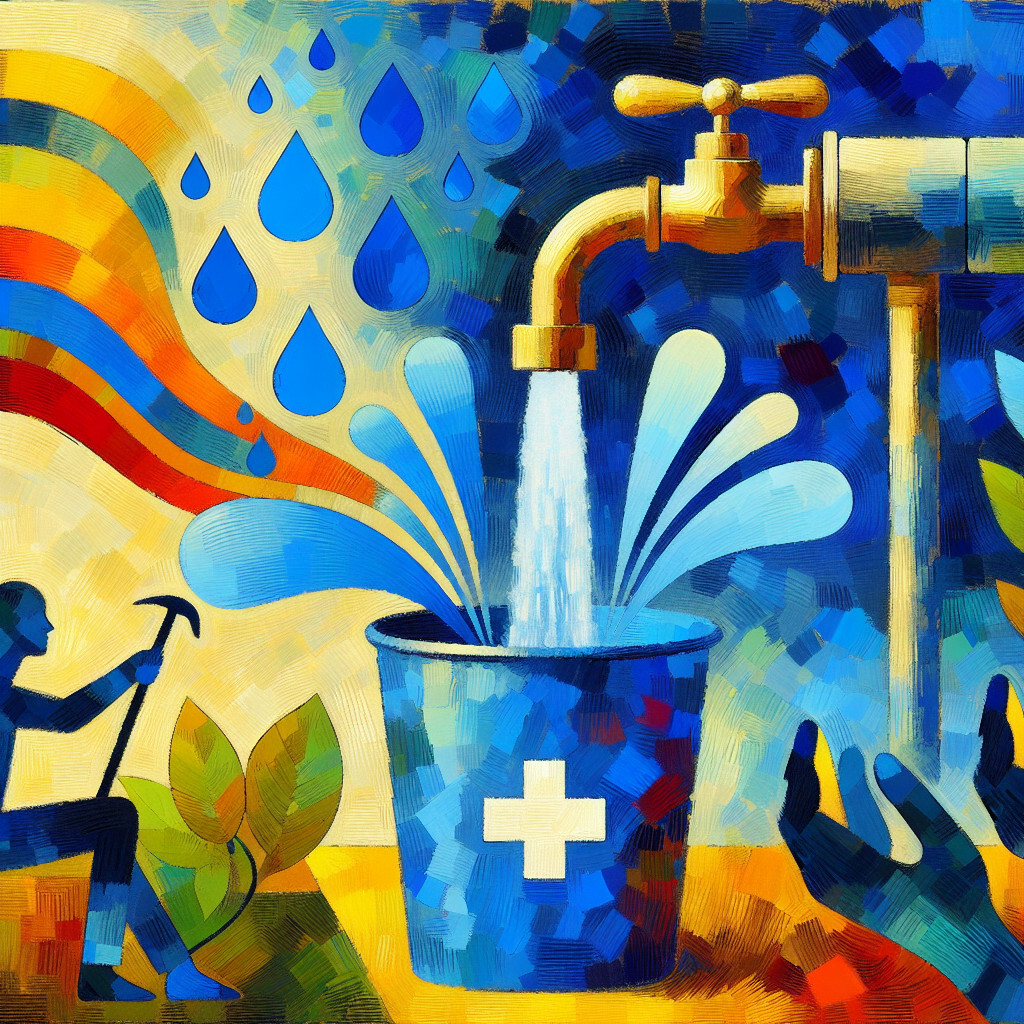-
Table of Contents
“Filtered Tap Water: A Healthy Choice for Hydration!”
Introduction

Filtered tap water is considered healthy as it undergoes a process that removes harmful substances like bacteria, algae, viruses, fungi, minerals, and man-made pollutants that can be found in untreated water. This process enhances the water’s quality, making it safe for drinking and cooking. However, the healthiness of filtered tap water can also depend on the quality of the original water source and the effectiveness of the filter used.
Understanding the Health Benefits of Filtered Tap Water
Filtered tap water has been a subject of debate for many years, with some people swearing by its health benefits and others expressing concerns about its safety. However, the consensus among health experts is that filtered tap water is not only safe to drink but also offers several health benefits.
The process of filtering tap water involves removing impurities and contaminants that may be present in the water supply. These can include chemicals, heavy metals, bacteria, and other harmful substances. The removal of these contaminants is crucial for maintaining good health, as they can cause a range of health problems if consumed in large amounts over time.
One of the primary benefits of filtered tap water is that it reduces the risk of gastrointestinal diseases. Many of these diseases are caused by bacteria, viruses, and parasites that can be present in unfiltered water. By removing these pathogens, filtered tap water can help to protect against diseases such as cholera, typhoid, and dysentery.
In addition to protecting against gastrointestinal diseases, filtered tap water can also help to improve the overall quality of your drinking water. Many people find that filtered water tastes better than unfiltered water, as it is free from the chlorine and other chemicals that are often used to treat tap water. This can make it more enjoyable to drink, which in turn can encourage people to stay hydrated.
Furthermore, filtered tap water can also be beneficial for those with specific health conditions. For example, people with weakened immune systems, such as those undergoing chemotherapy or living with HIV, are more susceptible to infections from bacteria and other pathogens. By removing these contaminants, filtered tap water can help to reduce the risk of infection in these individuals.
Moreover, filtered tap water can also be a healthier choice for pregnant women and young children. Some studies have suggested that exposure to certain chemicals in unfiltered tap water, such as lead, can have harmful effects on fetal development and children’s health. By removing these chemicals, filtered tap water can help to protect against these risks.
Despite these benefits, it’s important to note that not all water filters are created equal. Different filters can remove different types of contaminants, and some may be more effective than others. Therefore, it’s crucial to choose a filter that is certified to remove the specific contaminants that are a concern in your local water supply.
In conclusion, filtered tap water offers several health benefits, from reducing the risk of gastrointestinal diseases to improving the taste of your drinking water. However, it’s essential to choose a high-quality water filter and to maintain it properly to ensure that it continues to provide these benefits. While filtered tap water is not a panacea for all health problems, it can be a valuable part of a healthy lifestyle.
In the end, the choice between filtered and unfiltered tap water is a personal one, based on your specific health needs and concerns. But with the potential benefits of filtered tap water, it’s certainly worth considering as part of your daily hydration routine.
Is Filtered Tap Water a Safe Drinking Option?
Filtered tap water is a topic that has been the subject of much debate in recent years. Many people wonder if it is a safe and healthy drinking option. The answer to this question is not as straightforward as it may seem, as it depends on a variety of factors, including the quality of the tap water in your area and the type of filter you use.
Tap water in many parts of the world, especially in developed countries, is generally safe to drink. It is treated and tested regularly to ensure it meets the safety standards set by health authorities. However, despite these measures, tap water can still contain certain contaminants. These can include heavy metals like lead, chemicals such as chlorine and fluoride, and microorganisms like bacteria and viruses. While most of these contaminants are present at levels considered safe by health authorities, some people may still be concerned about their potential effects on health.
This is where water filters come in. Water filters are designed to remove or reduce the levels of specific contaminants in tap water. There are many different types of water filters available, ranging from simple pitcher filters to more complex under-sink or whole-house systems. The effectiveness of a water filter in removing contaminants depends on its type and quality. For example, activated carbon filters are effective at removing chlorine and certain organic compounds, but they cannot remove heavy metals or microorganisms. On the other hand, reverse osmosis filters can remove a wider range of contaminants, including heavy metals and certain microorganisms.
So, is filtered tap water a safe drinking option? In general, yes. If your tap water is already safe to drink, using a water filter can help to improve its taste and odor by removing chlorine. It can also provide an extra layer of protection by reducing the levels of certain contaminants. However, it’s important to remember that not all water filters are created equal. Some may not be effective at removing certain contaminants, and others may require regular maintenance to ensure they continue to work properly.
Moreover, while water filters can improve the safety of tap water, they are not a guarantee of purity. Even the best water filters cannot remove all potential contaminants. Therefore, if your tap water is contaminated with high levels of harmful substances, it may be safer to opt for bottled water or to use a water treatment system that is designed to deal with those specific contaminants.
In conclusion, filtered tap water can be a safe and healthy drinking option, but it’s not a one-size-fits-all solution. The safety of filtered tap water depends on the quality of your tap water and the type of filter you use. Therefore, if you’re considering using a water filter, it’s important to do your research and choose a filter that is suitable for your needs. And remember, no matter what type of water you choose to drink, it’s important to stay hydrated. Water is essential for our health, and we should all make sure we’re drinking enough of it.
The Role of Filtered Tap Water in Maintaining Good Health
Filtered tap water plays a significant role in maintaining good health, a fact that is often overlooked in our daily lives. The quality of the water we consume directly impacts our overall health and wellbeing. Therefore, it is crucial to understand the benefits of filtered tap water and its role in promoting good health.
Water filtration is a process that removes impurities from water by reducing the contamination using a fine physical barrier, a chemical process, or a biological process. Filters cleanse water to different extents for purposes such as providing safe drinking water, agricultural irrigation, accessible public and private aquariums, and the safe use of ponds and swimming pools.
Drinking filtered tap water has numerous health benefits. Firstly, it removes harmful substances. Tap water often contains various impurities, including heavy metals, chlorine, and bacteria. A good water filter can effectively remove these harmful substances, providing you with safe and clean water.
Secondly, filtered tap water can improve digestion. Water is essential for the proper functioning of your digestive system. It helps break down food so that your body can absorb the nutrients. Drinking clean, filtered water can thus help prevent digestive problems.
Thirdly, filtered tap water can contribute to weight loss. Drinking plenty of water is a key component of any weight loss program. Water helps control calories by making you feel full, and it also helps to boost your metabolism. Drinking filtered water ensures that you are drinking clean water free from impurities, which can be beneficial for weight loss.
Moreover, filtered tap water is better for your skin. Water plays a crucial role in maintaining the optimal skin moisture and delivering essential nutrients to the skin cells. It replenishes the skin tissue and increases its elasticity. Drinking clean, filtered water can help delay the signs of aging like wrinkles and fine lines.
Despite these benefits, some people may argue that filtered tap water lacks essential minerals found in unfiltered tap water. However, this is not entirely accurate. While it’s true that the filtration process can remove some minerals, the amount is usually insignificant. Most of our essential minerals come from the food we eat, not the water we drink. Therefore, the benefits of removing harmful contaminants from tap water far outweigh the potential loss of some minerals.
In conclusion, filtered tap water plays a significant role in maintaining good health. It provides us with clean and safe drinking water, free from harmful substances. It aids in digestion, contributes to weight loss, and is beneficial for the skin. While it may remove some minerals, the amount is usually insignificant, and the benefits of drinking filtered water far outweigh any potential drawbacks. Therefore, it is advisable to drink filtered tap water for maintaining good health.
However, it’s important to remember that not all water filters are created equal. Some filters are more effective at removing contaminants than others. Therefore, it’s essential to do your research and choose a high-quality water filter that can effectively remove harmful substances from your tap water. By doing so, you can ensure that you are drinking the healthiest water possible.
Debunking Myths: The Truth about Filtered Tap Water and Health
Filtered tap water has been the subject of numerous debates, with many questioning its health benefits and safety. This article aims to debunk some of the myths surrounding filtered tap water and shed light on its impact on health.
One of the most common misconceptions about filtered tap water is that it is devoid of essential minerals. This is not entirely accurate. While it is true that some filtration systems can remove minerals from water, not all do. Moreover, the mineral content in tap water is typically low, and our primary source of minerals should be a balanced diet, not water. Therefore, the argument that filtered tap water is unhealthy because it lacks minerals is not entirely valid.
Another myth that often circulates is that filtered tap water is not as safe as bottled water. This belief stems from the assumption that bottled water undergoes more rigorous testing and regulation than tap water. However, this is not necessarily the case. In many developed countries, tap water is subject to stringent quality control measures and is regularly tested for contaminants. When filtered, tap water can be just as safe, if not safer, than bottled water.
The type of filter used also plays a significant role in the quality of the filtered tap water. Some filters, like activated carbon filters, are effective at removing chlorine, which not only improves the taste and odor of the water but also eliminates a potential health risk. Other filters, such as reverse osmosis systems, can remove a broader range of contaminants, including lead and other heavy metals. Therefore, the healthiness of filtered tap water largely depends on the quality and type of filter used.
However, it is crucial to note that while filters can significantly improve the quality of tap water, they are not foolproof. Some contaminants, such as certain types of bacteria and viruses, may not be entirely removed by standard filtration systems. Therefore, in areas where the tap water quality is questionable, it may be necessary to use additional purification methods, such as boiling or using disinfectant tablets.
Furthermore, the maintenance of the filtration system is paramount to ensure the healthiness of the filtered tap water. Over time, filters can become clogged with the contaminants they have removed from the water, which can lead to a decrease in their effectiveness. If not replaced regularly, these filters can even become a breeding ground for bacteria. Therefore, regular maintenance and replacement of the filters are essential to ensure the safety and healthiness of the filtered tap water.
In conclusion, filtered tap water can indeed be healthy, provided that a good quality filter is used and properly maintained. It is a cost-effective and environmentally friendly alternative to bottled water. However, it is important to remember that the quality of tap water can vary greatly depending on the location, and in some cases, additional purification methods may be necessary. As with many things in life, the key to ensuring the healthiness of filtered tap water lies in being informed and taking the necessary precautions.
Q&A
1. Question: Is filtered tap water healthy to drink?
Answer: Yes, filtered tap water is generally safe and healthy to drink as the filtration process removes harmful contaminants.
2. Question: Can filtered tap water still contain harmful substances?
Answer: While filtration removes many contaminants, it may not remove all potential harmful substances. Some bacteria, viruses, and chemicals may still be present in small amounts.
3. Question: Does filtered tap water provide necessary minerals?
Answer: Yes, filtered tap water usually retains essential minerals like calcium, potassium, and magnesium that are beneficial for health.
4. Question: Is filtered tap water healthier than bottled water?
Answer: Both filtered tap water and bottled water can be healthy options. However, filtered tap water is often a more environmentally friendly choice and can be just as safe if the filtration system is properly maintained.
Conclusion
Filtered tap water is generally healthy as the filtration process removes contaminants, bacteria, and other harmful substances, while retaining essential minerals. However, the healthiness can depend on the quality of the filter and the condition of the tap water before filtration.






